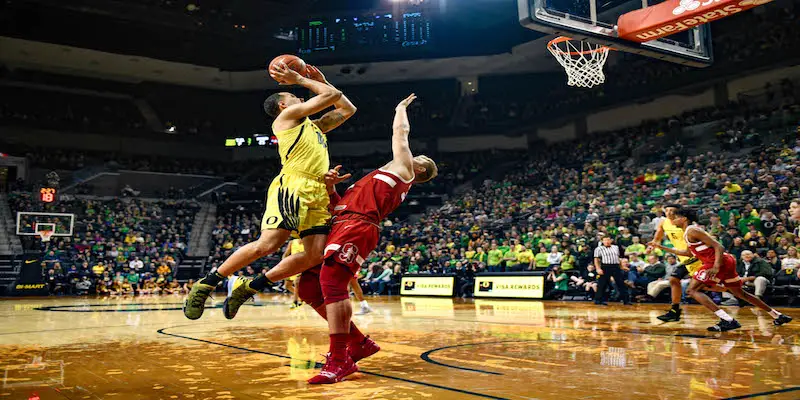Is there a more mentally tough team in NCAA basketball right now than the Oregon men’s basketball team? Some will point to the LSU team on the men’s side, but their issues have only been going on for a couple of weeks.
Here is what has happened to the Oregon men: they lost Bol Bol, didn’t have their current best player Louis King for the first six weeks, and had Abu Kigab, their most active and athletic returning player, transfer. Then, they lost Kenny Wooten, their best defender, to a broken jaw. Wooten was out for a month, and his playing time was limited for even longer. He sets up Oregon’s entire defense and was sorely missed.

Oregon’s length and hustle on defense left UW feeling sad on Senior night.
Playing with just nine scholarship players, they lost three games in brutal fashion, and lost to Washington earlier in the year on a phantom foul — one so bad that you might not see anything that horrific again until sometime around the apocalypse.
Oregon finally found an identity though: defense. Against Washington, Payton Pritchard had a handful of steals and raced back to tip a full-court outlet that would’ve been a dunk.
The Ducks are also now using their length to disrupt offenses. The emergence of Francis Okoro offensively on the block and the boards gives Oregon presence in the post. Right now, Okoro’s only an average threat, and still, the looks are getting better on the perimeter for everyone else. Oregon hasn’t had that since Bol went out.
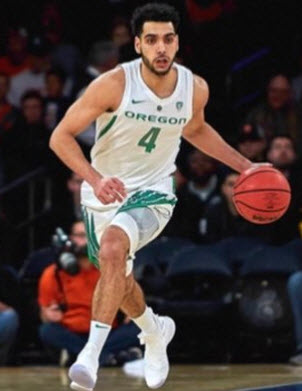
Ehab Amin has stepped up his play as of late.
Okoro does need to practice protecting the ball and knowing who to outlet to, though. It’s showing itself as a problem, as he grabs double-digit rebounds each game now. Teams recognize it and are trying for steals each time. Hands in, elbows out, make a 180º turn to outlet the ball. If he does it just once it will keep smaller guys away.
Watch for Altman to give referees a clue that Okoro’s going to be protecting the ball so it’s not called if someone gets one in the cheek.
Miles Norris is making a difference by hitting the occasional three, forcing passes wider and contesting shots correctly by using his length as an advantage. He’s also doing a good job of staying back and then relying on his wingspan to contest shots.
Will Richardson and VJ Bailey are playing hard, keeping guys in front of them, and not reaching like they were earlier in the year. Even Ehab Amin is gambling less on defense. Overall, the Ducks are forcing teams to make tough shots and rebound. That’s coaching. It just took this year’s team an extra four weeks to get there.
Conference Tourney Win or Bust?
Despite injuries, a transfer, horrific luck and a call that robbed them of a chance to win a game in overtime, here come coach Dana Altman’s Ducks! They’re winners of four straight, owners of a 19-12 record, and a team that’s found its identity about a month later than most Altman teams do. No excuses, but without the injuries it’s hard to imagine that they wouldn’t be at least 23-8 right now.
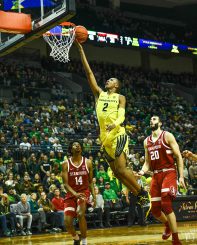
King needs to score consistently for Oregon to win four in four days.
If they don’t win the conference tournament, they won’t get into the NCAA Tournament. A lot of fans are now saying that they only need to win three.
They’re wrong.
Horrific losses to Texas Southern, two to UCLA and one to Oregon State, along with one of the weakest schedules in years and the lack of respect that the Pac-12 has, means that they have to win four games in four days to make it.
Can they do that? Probably not. They can beat any one team at any time, but they may not have the depth or enough scorers to win four days in a row.
I hope that they do. I really do. But it’s asking a lot. Paul White will be good one game and invisible the next, and at some point King or Pritchard won’t make shots, and they’ll lose. The legs won’t be there at some point, just as they weren’t there for the women on Sunday (I’m getting to that).
The Bracket Sets Up Well For Oregon
The good news is they start against Ernie Kent’s Washington State Cougars. That should be a win, even though the Cougars are playing for Kent’s coaching life in Pullman. (The irony of it all.) The first half may be pretty physical, but let’s assume the Ducks win that one. Then they’ll play Utah, a team they beat earlier this year on the road.
Win and advance. Lose, and prepare to host an NIT game. A win means they’ll likely play UCLA or Arizona State.
Again, win and advance, lose and prepare to host an NIT game. Then, who knows who comes out of the top bracket? But Oregon did just beat Washington and Arizona. Who would scare you from that bracket? Nobody. But I think that the Ducks would be gassed by then. Absolutely gassed.
So you see, the Ducks have the ability to win every game, but the task is monumental. We’ll see how far they go come tourney time.
Oregon’s Women Can Win It All (Five Ways To Beat You)
Oregon’s legs gave out against Stanford. The shooting stats prove it: the Ducks went 6-22 from three, and while the announcers yapped on and on about Stanford’s solid defense, Oregon missed at least eight clean looks from behind the arc.
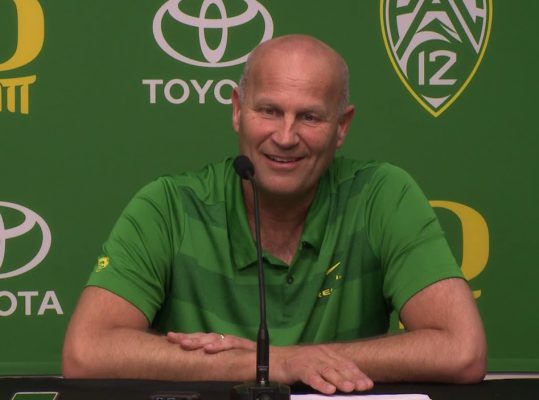
Graves’ ability to use Oregon’s different styles of play during games is a difference maker.
Erin Boley airballed a wide open three. Satou Sabally threw up a total brick with nobody around and her feet set. It’s the legs that go first, and their lack of depth caught up with them. They won’t have to play three games in three days from here on out, but they will have to play two tough games in a row in the regionals.
They wore down mentally as well. Maite Cazorla was stripped of the ball in the open court, Sabally went baseline with nowhere to go — the list of mental mistakes is long. Still, the loss might actually be a good thing in some ways. They were going to have a game like that eventually; why not get it out of the way now? If they keep winning, they won’t play a team as good as Stanford until the regional finals.
Winning six in a row requires some luck, but luck can be created a bit with a team’s ability to win in different ways. Oregon might face two or three different styles of play in the coming weeks, but few teams have more ways to attack their opponents than the Ducks do.
Here’s how Oregon can adapt, game by game, or even quarter by quarter.
1) The half court post up game. They can slow things down and play the low-post game with Ruthy Hebard or the pick-and-roll with Sabrina Ionescu and Hebard.
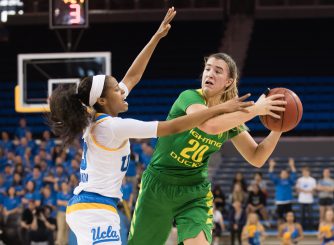
Ionescu is deft at getting the ball to Ruthy Hebard in the right spot.
2) Drive and kick. This requires great guards and great shooters; Oregon has both. Ionescu or Cazorla drive it and kick it to the other, or Boley or Morgan Yeager.
3) They can run. The Ducks have the type of players that you need to break effectively: forwards with speed. They have three proven ball handlers, Ionescu, Cazorla and Sabally, so they can rebound and go, or outlet to anyone up court.
That extra split second translates to more layups, more kick-out, wide-open looks for the three, and it creates tempo. Oregon did a lot of that off of Stanford misses on Sunday.
4) Defense that shuts teams down late. This team’s defense gets better as the game wears on. Odd, since they have such a short bench, but the stats bear it out. Arizona scored zero points in the fourth quarter last month, at home. Zero.
5) Everyone contributes. Boley scored 13 points early in the game against UCLA. Yeager hit a huge three late in game. Hebard scored in between. And everyone rebounds. Whoever is hot gets the ball. Everyone plays tough defense and rebounds. Hebard or Ionescu are going to have off nights, but Oregon isn’t dependent on a superstar to win games.
What Could Derail Them?
Depth. Like the men, their bench is short. Three games in three days and an OT, and Oregon came out absolutely dead-legged against Stanford. They started off one for nine from three! And many of those were open looks. Those are dead legs.
Only nine scholarship players are available right now, and Taylor Chavez is out, so … only eight. Yikes. Yeager’s contribution versus UCLA was huge, but it’s a very short bench with only Oti Gildon, Yeager and Lydia Giomi available to play.
Someone will give them trouble in a walk-it-up kind of game where the score is in the 60s or 70s. That’s Baylor; they’re a matchup problem for everyone. They force that style and kill people on the boards.
We’ll talk about how Oregon overcomes that if and when they get there.
Bob Rickert
Lake Oswego, Oregon Top Photo by Scott Kelly
 Bob Rodes, the FishDuck.com Volunteer editor for this article, is an IT analyst, software developer and amateur classical pianist in Manchester, Tennessee.
Bob Rodes, the FishDuck.com Volunteer editor for this article, is an IT analyst, software developer and amateur classical pianist in Manchester, Tennessee.
Related Articles:
Ducks Football 2026: Breaking Down Strengths And Weaknesses
These Ducks Will Have Monster Second Seasons as Starters
Oregon Football: Early 2026 Ranking Projections
FishDuck Foaming Over Upside of 2026 Diamond Ducks
Unbelievable...Same SEC Stuff, Different Day
Why Oregon Football Always Belongs in the National Conversation
A native Oregonian, Bob’s spent 16 years covering Duck football and basketball for AOL Fanhouse, OregonLive and Rivals.com. He’s also hosted a sports talk show on ESPN Radio and led marketing for the Oregon Sports Hall of Fame.

